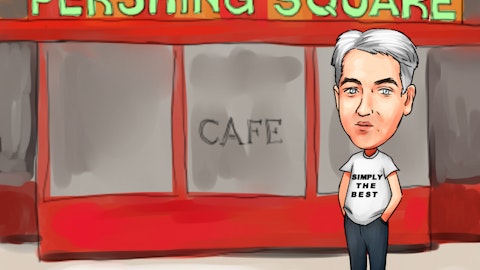Join The Motley Fool for a conversation with retired Costco Wholesale Corporation (NASDAQ:COST) CEO Jim Sinegal. In love with retail since his first job as a bagger in 1954, Jim co-founded Costco, and served as president and CEO of the retail giant from 1983 until his retirement in January 2012.
Costco Wholesale Corporation (NASDAQ:COST) is known for its culture and low turnover. Jim discusses the critical role of corporate culture — and how to preserve it as the retailer grows ever larger — as well as the company’s deep-seated (and mutual) appreciation for its employees.
To watch the entire interview, click here.
Brendan Byrnes: How would you define a competitive advantage, and what would you say is Costco Wholesale Corporation (NASDAQ:COST)‘s biggest competitive advantage?
Jim Sinegal: Well, the competitive advantage is that you’ve got loyal customers who believe in you. We think — this was a tag that was hung on us a number of years ago by an analyst at Goldman Sachs Group, Inc. (NYSE:GS) — we think that we have established what we refer to as “absolute pricing authority.”
This analyst said that “Costco Wholesale Corporation (NASDAQ:COST), more than any other retailer in the world, has established absolute pricing authority.” What he meant by that was that, when a customer sees a product in Costco, they expect that it’s going to be the best value that they can find.
We really very zealously work on protecting that image. That’s what we’re all about, saving customers money. We don’t want to just be better, in terms of price. We want to be demonstrably better on every single product that we sell.
Brendan: One of the things Costco Wholesale Corporation (NASDAQ:COST) is known for is a strong culture, and also you’ve made some great strategic decisions over the years. Could you talk about which one of those do you think is more important — culture versus strategy — and how those come together?
Jim: I’ve stated this in the past, and my comment is that culture is not the most important thing in the world. It’s the only thing.
It is the thing that drives the business. That’s what drives the strategy of our business, is our culture. Recognizing what we stand for in the customer’s eyes, and what we mean to all of the stakeholders in our business.
That is the culture of our business, and we would hope that we’ll continue to sustain that. If we do that, if we think in those terms, then I think the strategic planning will come right along with that. We recognize that you’ve got to continue to be better. Every day when you open the doors, it’s like show business. It’s another show.
We have to stay on top of our game because, as I mentioned to you earlier, there are no annuities in this business. It’s not a guarantee that they’re going to shop with you next year if your presentation is ho-hum.
Brendan: Could you talk about how you maintain that strong culture, growing as fast as you have? You have thousands and thousands of employees both here, also abroad in Asia and the United Kingdom. How do you maintain a strong culture with being spread out and having so many employees?
Jim: You have to work at it. One of the things that we try to do, we think of ourselves as a small company. I know you say, “Well, you’ve got 175,000 employees. How could you possibly think of yourself as a small company?”
We like to think like a small company. It’s more and more difficult. Every year that goes by makes it more difficult, but we think that if you’re thinking, and if your mentality is such, that you’re more adroit, that you’re nimble, and that you can move quickly.
We want to always try to stay in that position, in that posture — to be very adroit and very nimble, and able to react quickly and stay ahead of the competition. How well we do that will determine how successful we are in the future.
Brendan: One of the things Costco is also known for is their low turnover. Other than financial incentives, what are some non-financial incentives that keep that number low, that your employees really count on?
Jim: We love them.
Brendan: Yeah.
Jim: Listen, these are great people. Many of them have been with us since the early days of our business. They’ve helped bring Costco to where it is today. They’ve developed it. They’ve played a pivotal role in everything that has been established over the last 30 years.
We want to keep them. We want them to stay with it. We want to turn our inventory, but not our people. Part of that is, people are happy with a job for more reasons than money. There’s generally a pride in the organization.
There’s an attitude that there’s security, that somebody does care about them, that we’re offering careers. We’re not offering jobs; we’re offering careers. Anyone who wants to become an officer of our company has that opportunity available to them.
One of the greatest satisfactions that I think, if you ask the many of us who have been here in management, one of the greatest satisfactions is to see young people who started working with us, who maybe were college students and were chasing shopping carts out in the parking lot, who have advanced to the point where they’re senior managers of our company. That’s a great feeling, to see that.
The article Costco Co-Founder: “Culture Is Not the Most Important Thing — It’s the Only Thing” originally appeared on Fool.com and is written by Brendan Byrnes.
Brendan Byrnes has no position in any stocks mentioned. The Motley Fool recommends Costco Wholesale (NASDAQ:COST). The Motley Fool owns shares of Costco Wholesale.
Copyright © 1995 – 2013 The Motley Fool, LLC. All rights reserved. The Motley Fool has a disclosure policy.



